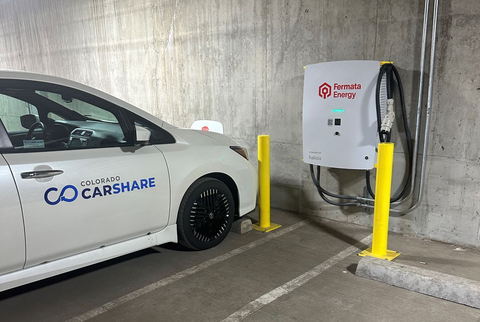Fermata Energy and Xcel Energy Announce Transformative Vehicle-to-Everything Bidirectional Charging Pilot
Balancing Grid Supply and Demand with Electric Vehicles in

Fermata Energy and Xcel Energy's Vehicle-to-Everything (V2X) bidirectional charging pilot project at Boulder Housing Partners’ 30 Pearl development (Photo: Business Wire)
Fermata Energy's intelligent bidirectional charging platform paired with four (4) FE-20 chargers and two (2) of Colorado CarShare’s Nissan LEAFs will showcase V2X and Vehicle-to-Building (V2B) technology's untapped potential. When an electric vehicle is parked and in V2X mode, the Fermata Energy platform leverages the vehicle’s battery energy to offset and lower the building’s peak demand. Fermata Energy’s Demand Charge Management (DCM) software intelligence manages the total system power and energy via charge rate, frequency and depth while intelligently preserving the vehicle's battery health. This technology is designed to optimize customer value by curtailing building peak demand at the same time preserving needed range for the expected electric vehicle duty cycle.
"We're on the cusp of a transformative era in energy management, where electric vehicles transcend their traditional transportation roles to become pivotal in increasing grid resilience and sustainability," Tony Posawatz, CEO of Fermata Energy, stated. "This collaboration with Xcel Energy is more than a project; it's a blueprint for an attainable global renewable energy ecosystem.”
“This program helps deliver the benefits of electric vehicles to all customers in the communities we serve, including those that don’t drive, or drive electric. This project is a proof of concept of bi-directional charging, to assess technology with the potential to enhance customer bill savings,” said Huma Seth, Director of Clean Transportation at Xcel Energy. “We know EVs can help customers save money on their transportation costs and they deliver cleaner air for everyone because they are powered with increasingly clean electricity.”
Beyond these newest deployments, Fermata Energy's V2X impact is notable. Since December 2020, the
The collaboration between Fermata Energy, Xcel Energy,
About Fermata Energy
Fermata Energy is a leading platform services provider of intelligent Vehicle-to-Everything (V2X) bidirectional charging technology, including Vehicle-to-Grid (V2G), Vehicle-to-Home (V2H), and Vehicle-to-Building (V2B) solutions. The company was founded in 2010 to accelerate the adoption of bidirectional energy technology solutions through inspiration and innovation. Fermata Energy’s proprietary technology enables its customers to manage EVs as distributed energy resources by selling excess energy stored in parked EV batteries to offset costly peak demand charges. To learn more about Fermata Energy, please visit https://fermataenergy.com/ and follow the company on LinkedIn.
About Xcel Energy
Xcel Energy (NASDAQ: XEL) provides the energy that powers millions of homes and businesses across eight Western and Midwestern states. Headquartered in
About Colorado CarShare
This collaboration not only showcases cutting-edge technology, but also aligns with Colorado Carshare’s commitment to environmentally sustainable and socially responsible transportation solutions. For more information, visit carshare.org, Facebook, Instagram.
About the
The city’s Climate Initiatives Department drives efforts to slow climate change and build a more resilient community for all, with a focus on energy systems, the circular economy and nature-based climate solutions. Learn more about the
View source version on businesswire.com: https://www.businesswire.com/news/home/20240520170080/en/
Fermata Energy Media Contact:
media@fermataenergy.com
Xcel Energy Media Contact:
mediainquiries@xcelenergy.com
Colorado CarShare Media Contact:
info@carshare.org
City of Boulder Media Contact:
niclil@bouldercolorado.gov
Source: Fermata Energy







